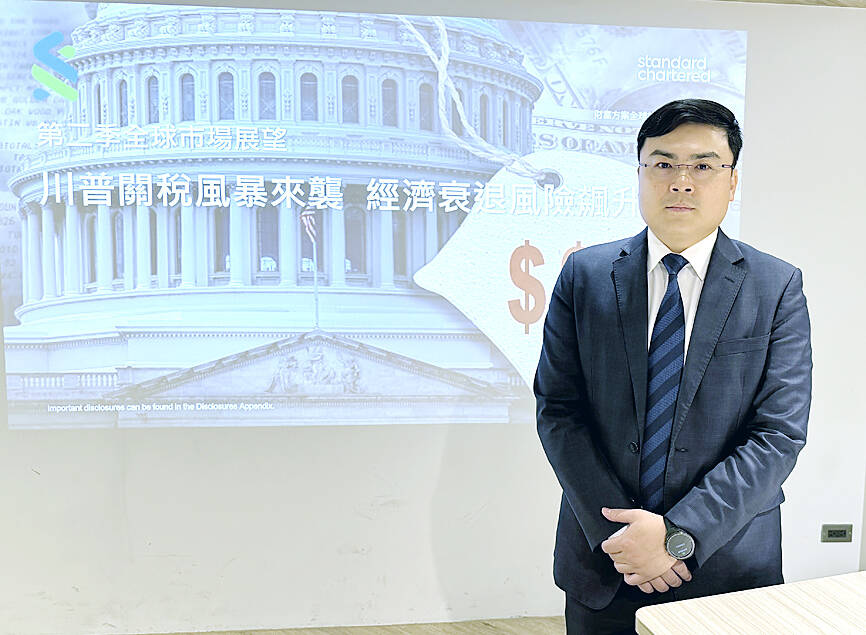Taiwan could see a decline in exports and GDP growth due to the US’ implementation of a 32 percent “reciprocal” tariff on Taiwanese goods from yesterday, economists said yesterday.
Taiwan’s exports to the US are likely to dampen in the coming 12 months, with a direct impact on GDP ranging from 1.2 to 2.5 percentage points, depending on the elasticity of US import demand, Standard Chartered Bank senior economist Kelvin Lau (劉建恆) said.
Taiwan’s tech sector — especially firms supplying advanced chips and information communications technology products — is expected to be less affected by the tariffs due to their global technology leadership positions.

Photo: CNA
The actual economic blow could be milder, as other competing markets are also subject to tariff barriers, he said.
“While the short-term pain is real, Taiwan’s relative competitiveness won’t be substantively eroded,” Lau said.
Taiwan’s central bank is expected to hold interest rates steady this year with the consumer price index expected to hover at about 2.1 percent, he said.
Standard Chartered stood by its forecast of 3 percent for Taiwan’s GDP growth this year, but it has seen intensifying downside risks, he added.
Allen Liu (劉家豪), head of wealth management strategy at Standard Chartered, urged Taiwanese manufacturers to assess the substitutability of their products in the global market.
“If there are no viable alternatives elsewhere, they may have stronger bargaining power with US companies and pass tariff costs onto US importers,” Liu said.
Further, the US does not have a supply chain of electronics and it would not be easy to move production lines to the US quickly, he said.
How Washington implements its tariff policy would shape related firms’ global deployment, he added.
Although the US claims economic strength, it is also under pressure to speed up trade negotiations, and US-Taiwan trade talks merit close attention, Liu said.
Moody’s shared similar observations, saying that Trump’s sweeping new tariffs represent the largest increase since the 1930s and the implications are unfolding across the world.
The new tariffs on Asian markets turned out more draconian than expected, which is unfavorable for the region, the ratings agency said.
The region is exposed to higher US tariffs directly and indirectly, it said, adding that direct exposure is the heaviest for economies such as Taiwan, China and Vietnam.
“This major shift in US trade policy is credit negative for the region, but we expect the vast majority of countries to negotiate rather than to retaliate through strategies such as establishing bilateral trade agreements or buying more US goods,” Moody’s said.

TARIFFS: The global ‘panic atmosphere remains strong,’ and foreign investors have continued to sell their holdings since the start of the year, the Ministry of Finance said The government yesterday authorized the activation of its NT$500 billion (US$15.15 billion) National Stabilization Fund (NSF) to prop up the local stock market after two days of sharp falls in reaction to US President Donald Trump’s new import tariffs. The Ministry of Finance said in a statement after the market close that the steering committee of the fund had been given the go-ahead to intervene in the market to bolster Taiwanese shares in a time of crisis. The fund has been authorized to use its assets “to carry out market stabilization tasks as appropriate to maintain the stability of Taiwan’s

STEEP DECLINE: Yesterday’s drop was the third-steepest in its history, the steepest being Monday’s drop in the wake of the tariff announcement on Wednesday last week Taiwanese stocks continued their heavy sell-off yesterday, as concerns over US tariffs and unwinding of leveraged bets weighed on the market. The benchmark TAIEX plunged 1,068.19 points, or 5.79 percent, to 17,391.76, notching the biggest drop among Asian peers as it hit a 15-month low. The decline came even after the government on late Tuesday authorized the NT$500 billion (US$15.2 billion) National Stabilization Fund (國安基金) to step in to buoy the market amid investors’ worries over tariffs imposed by US President Donald Trump. Yesterday’s decline was the third-steepest in its history, trailing only the declines of 2,065.87 points on Monday and

TARIFF CONCERNS: The chipmaker cited global uncertainty from US tariffs and a weakening economic outlook, but said its Singapore expansion remains on track Vanguard International Semiconductor Corp (世界先進), a foundry service provider specializing in producing power management and display driver chips, yesterday withdrew its full-year revenue projection of moderate growth for this year, as escalating US tariff tensions raised uncertainty and concern about a potential economic recession. The Hsinchu-based chipmaker in February said revenues this year would grow mildly from last year based on improving supply chain inventory levels and market demand. At the time, it also anticipated gradual quarter revenue growth. However, the US’ sweeping tariff policy has upended the industry’s supply chains and weakened economic prospects for the world economy, it said. “Now

Six years ago, LVMH’s billionaire CEO Bernard Arnault and US President Donald Trump cut the blue ribbon on a factory in rural Texas that would make designer handbags for Louis Vuitton, one of the world’s best-known luxury brands. However, since the high-profile opening, the factory has faced a host of problems limiting production, 11 former Louis Vuitton employees said. The site has consistently ranked among the worst-performing for Louis Vuitton globally, “significantly” underperforming other facilities, said three former Louis Vuitton workers and a senior industry source, who cited internal rankings shared with staff. The plant’s problems — which have not